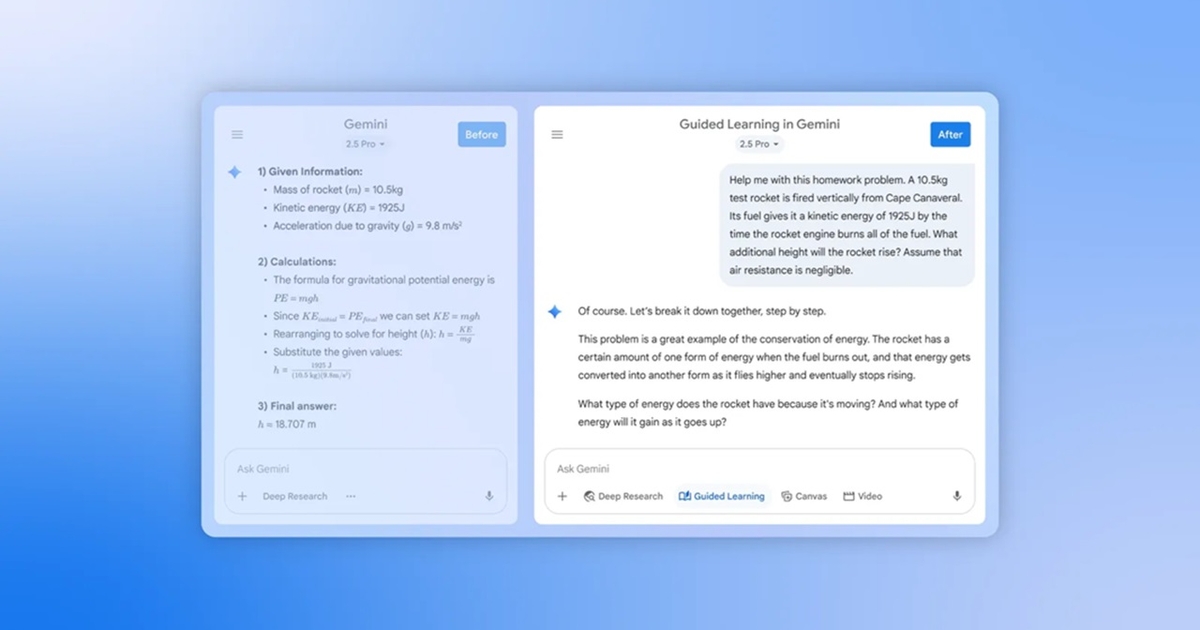Here are the most-read stories on AI Business this week.
Google Launches AI ‘Guided Learning’ Tool to Teach Users
Google has launched a new AI tool that the company said acts as a “personal learning companion” to users.
The tool, Guided Learning, is available within Gemini and is designed to teach users rather than simply answering their questions, leading them through problems and helping them develop critical thinking skills.
“The aim is to help you build a deep understanding instead of just getting answers,” Maureen Heymans, Google’s vice president of learning and sustainability explained in a blog post. “Guided Learning breaks down problems step-by-step and adapts explanations to your needs — all to help you build knowledge and skills.”
The new capabilities were developed in collaboration with educators, students and “pedagogical experts,” Heymans said. Using this information, Google created a family of models designed specifically for educational teaching, called LearnLM, which were integrated into Gemini to create Guided Learning.
Dell Tackles Unstructured Data for Generative AI Applications
Dell Technologies has updated its AI Data Platform to make unstructured enterprise data more accessible for generative AI applications. The enhancements focus on transforming the vast amounts of unusable enterprise data into actionable intelligence through improved indexing and vector retrieval.
Generative AI requires high-quality, accessible data, but according to Dell, most enterprise data remains unusable without continuous indexing and robust vector retrieval engines. The updated platform directly addresses the challenge through enhanced data preparation and access capabilities.
At the core of the update is a new “unstructured data engine” developed in collaboration with AI search company Elastic. This engine provides advanced vector search and semantic retrieval capabilities essential for generative AI applications that need to process and understand unstructured content.
NTT DATA Launches Global Microsoft Cloud Unit to Accelerate AI
NTT DATA has unveiled a new global business unit dedicated to Microsoft Cloud, designed to meet “rising demand” for secure, AI-powered enterprise cloud solutions.
Led by Aishwarya Singh, the global head of Microsoft practice, cloud and agentic AI for NTT DATA, the unit spans more than 50 countries and includes a network of Microsoft-certified specialists with more than 24,000 certifications.
The move comes as organizations across sectors look to modernize IT and data center operations to support generative and agentic AI applications.
The partners said the unit will focus on cloud-native development, security and observability, while helping customers navigate complex compliance and sovereignty challenges.
PTC, Nvidia Partner to Accelerate AI Product Design
PTC has announced a major expansion of its collaboration with Nvidia, integrating the computing company’s Omniverse technologies into its flagship Creo and Windchill platforms.
The move, PTC said, will “transform” how AI and data management products are designed, simulated and brought to market. These next-gen products include AI foundation infrastructure, high-performance PCBs, advanced cooling systems and large-scale data center equipment.
PTC has also joined the Alliance for OpenUSD, which it said reinforces its “commitment to open standards and data interoperability for AI development.”
“Today’s most advanced products — from AI hardware to industrial machinery — are more complex, integrated and engineering-intensive than ever before,” said Neil Barua, PTC’s CEO. “By deepening our collaboration with Nvidia and joining the Alliance for OpenUSD, we’re giving our customers the ability to incorporate design and configuration data in a real-time, immersive simulation environment.”
Nvidia Unveils Agentic AI, Physical Robotics Models
Nvidia has launched a series of next-generation agentic AI and physical robotics models at the Siggraph 2025 conference this week in Vancouver.
Among the announcements are new Omniverse libraries, the Cosmos Reason model and the RTX Pro 6000 Blackwell Server Edition GPU, advancements that Nvidia said would reshape digital twins, physical A, and high-performance enterprise computing.
Nvidia’s new Cosmos Reason model is a customizable 7-billion-parameter vision-language model designed for physical AI, meaning machines that reason, plan and act in the physical world.
The model allows vision agents and robots to “reason like humans” using prior knowledge and common sense to make decisions.

